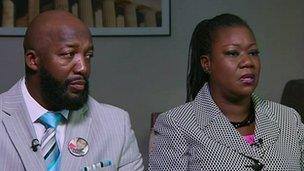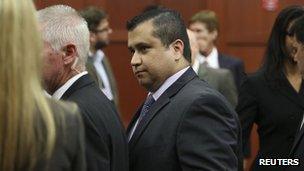Trayvon Martin's parents on path to forgive George Zimmerman
- Published
"The verdict will not define Trayvon's life," his parents tell the BBC's Rajini Vaidyanathan
It has been more than a month since George Zimmerman was acquitted by a jury of the murder of Trayvon Martin. In their first British media interview since the verdict, the teenager's parents told the BBC's Rajini Vaidyanathan they are working hard to build a legacy for their son, and are beginning the difficult process of forgiving his killer.
It has been 18 months since their son, Trayvon Martin, was killed by neighbourhood watch volunteer George Zimmerman.
Since the verdict that divided the US, the 17-year-old's parents, Tracy Martin and Sybrina Fulton, say that while they are still disappointed by the jury's decision, they want something good to come out of their loss.
"We've said the verdict will not define Trayvon's life," Ms Fulton said. "We are just committed to change, to being some type of positive influence."
The focus of their efforts is the Travyon Martin Foundation, external, under which they are pushing to change the laws on self-defence.
"We certainly have a long way to go, because when we have teenagers that are not safe walking down the street and you have laws that will justify somebody taking their life, that means we have a lot of work to do," Ms Fulton said.
"Trayvon was no criminal," she adds. "He was not committing any crime. If you see the pictures of him, he was always smiling; he was always happy. Those are the things we want people to focus on most about Trayvon."
Call to vote
Mr Martin and Ms Fulton want their son's death to lead to concrete changes in the law.
They are pushing for a "Trayvon Martin amendment" to be brought in, to challenge controversial "stand your ground" laws.

Tracy Martin and Sybrina Fulton will speak at a rally marking 50 years since the March on Washington
Variants of the robust self-defence measure are legal in a number of US states, but Mr Martin and Ms Fulton say they encourage aggressors.
George Zimmerman was not arrested for six weeks after he shot Trayvon Martin dead because, under Florida law, you are allowed to use lethal force if you believe your life is in grave danger.
The jury in the trial acquitted him, believing his assertion that he acted in self-defence.
Trayvon Martin would have turned 18 this year, and could have registered to vote.
His parents say one of the most important messages they can send out to young people approaching the same milestone is to register too, so they can vote to bring about changes in legislation.
In the past few weeks Mr Martin and Ms Fulton have spoken at rallies, attended by activists and stars including Beyonce and Jay Z, to bring their cause to wider attention.
I met them on the eve of a big rally to commemorate the 50th anniversary of the March on Washington, and Martin Luther King's "I have a dream" speech. They will take to the podium alongside civil rights leaders such as the Reverend Al Sharpton.
"Being part of this whole event is an honour," says Mr Martin.
For Mr Martin, his son's death was simply about what was right and wrong.
"Had George Zimmerman been an African-American man, we still would be seeking the same justice as we would in this case. Race did play an issue. But we didn't make it a race issue. Never once."
'Healing process'
President Barack Obama spoke about the racial dimension to the case when he delivered a candid speech about race relations in America, in the wake of the verdict. "Trayvon Martin could have been me 35 years ago," he said.

The acquittal of George Zimmerman divided opinion in the US
The family says his message touched their hearts.
"Looking through our eyes, this is coming from the most influential man on the planet. Whether he's African-American or not, just to have the president of this great nation to put Trayvon in text, it feels good."
So what would their son have made of the attention his case has garnered?
"I think he'd be very proud," said Ms Fulton. "I think he's smiling and saying, yeah, and cheering and telling us to move forward… and stand up for him," she added, with a smile.
Mr Martin and Ms Fulton are Christians who believe in forgiveness. Could they ever find it in themselves to forgive George Zimmerman, I ask, as the interview winds up.
"As Christians we have to forgive," says Ms Fulton. "But it's a process, and we are still going through that healing process.
"We are still in the process of forgiveness. We know it's coming but we're just not there yet."
- Published24 August 2013
- Published21 July 2013
- Published20 July 2013
- Published14 July 2013
- Published23 July 2013
- Published12 July 2013
- Published16 July 2013